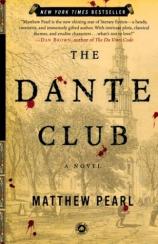The Dante Club
Review
The Dante Club
In 1867 Dante Alighieri's THE DIVINE COMEDY was almost banned in Boston.
History tells us that Harvard College's academic community worked feverishly to prevent the publication of Henry Wadsworth Longfellow's first American translation of THE DIVINE COMEDY. The powerful Brahmins considered the book to be a blasphemous and insidiously dangerous work --- a scandalous tome that would corrupt readers and lead them into perdition. Matthew Pearl uses this historical event as his canvas to flesh out his tale of murder, madness, fear and friendship in his first novel, THE DANTE CLUB.
Juxtaposed against this heady, contentious background, Pearl delivers an amazing tale about the real life Dante Club, whose respected members were Henry Wadsworth Longfellow, the poets Dr. Oliver Wendell Holmes (father of the great jurist) and James Russell Lowell, historian George W. Greene and their publisher, J. T. Fields. The mission of the club was to help Longfellow, their friend and colleague, bring THE DIVINE COMEDY into America's growing literary canon. Their weekly meetings also served as a forum for them to discuss their own work, each other's work and worldly issues. But the lofty pursuits of these men are interrupted when a spate of grisly murders plague Boston --- and so the fiction begins!
"What kind of madman would be recreating the gruesome deaths depicted in Alighieri's INFERNO?" That is the question that haunts the members of the Dante Club, for it is they who recognize the demonic twist in the murderer's modus operandi. They are quite shocked when they realize the murderer is acting out the foul "punishments" Dante wrote about. "How could this be?" they ask each other, because as far as anyone knows, nobody in America has even seen the Italian tome. After long deliberation, they decide that it's in their best interest not to go to the police with their observations ... lest they be charged with the atrocious crimes. Thus, with good intentions, they set about to solve the murders themselves. Their efforts are laudable and Dr. Holmes takes charge while J. T. Fields remains grounded in common sense whenever things get out of hand.
But, my fellow bibliophiles and devoted readers, let's backtrack for a moment to examine the physicality of the book. First, the jacket is splattered with blood spots. Second, when you open to the title page you will find a horrific depiction of Hell that will both repel and draw you in. And, when you finally turn the page to begin your journey, you are greeted by "CAUTION TO THE READER ... A PREFACE ..." and at the end of his comments he closes with this sentence, "If you continue [to read this book] remember first that words can bleed." Chilling perhaps, but clever devices nonetheless; they serve to set the mood of this imaginative and wholly enjoyable novel. Mr. Pearl is an award winning Dante scholar who, at the age of twenty-six, has delivered a witty, ironic, sardonic, interesting, entertaining, gruesome, ingenious, well plotted and unconventional novel in the spirit of E. L. Doctorow's best "fiction." His characters, both real and fictional, make for a community of folks who are unforgettable in their respective roles.
Now and then, a new writer appears on the horizon with a smash hit, only to disappear when the sun goes down. Matthew Pearl is not a "one novel wonder." He has the ability and intellectual dexterity to bring forth the kinds of large fictions nineteenth century readers were accustomed to --- books in which an individual could immerse her/himself and come away stimulated with new ideas. And so it is with THE DANTE CLUB, a very important book. It works on many levels and has the sparkle needed to inspire readers to recommend it to their friends. Maybe it will even prompt you to explore INFERNO. And, if not, that's okay too. Fortunately, you don't have to be a Dante scholar to realize that this work will be discussed and analyzed and read with relish. Enjoy THE DANTE CLUB!
Reviewed by Barbara Lipkien Gershenbaum on January 21, 2011










